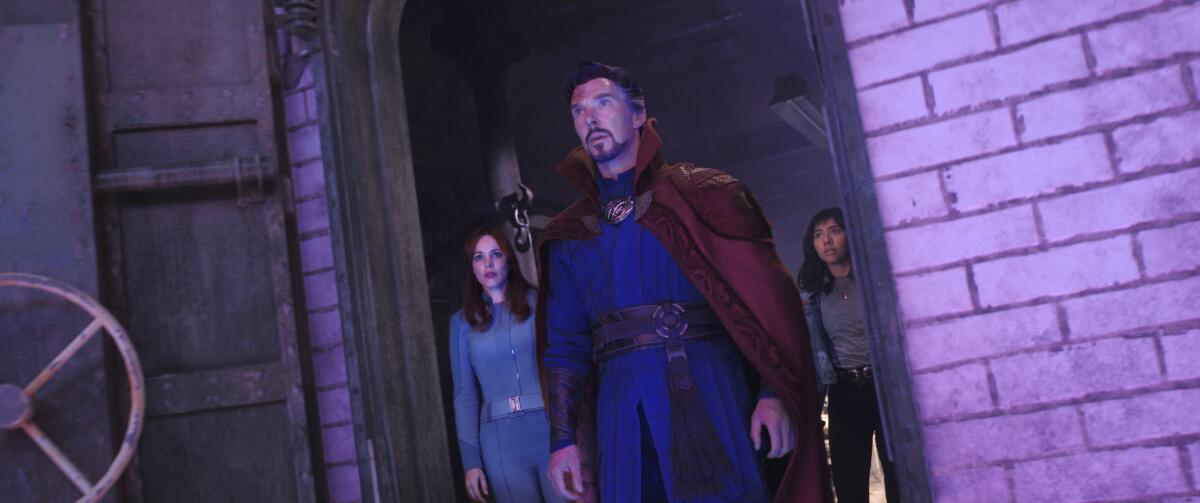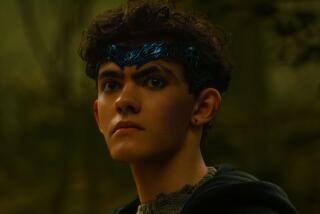Here’s how the ‘Doctor Strange’ Illuminati death scene came to life

Warning: This story contains spoilers for “Doctor Strange in the Multiverse of Madness.” For spoiler-free coverage, check out our review and story about the making of the film and come back to this later.
When asked to describe his favorite part about working on “Doctor Strange in the Multiverse of Madness,” screenwriter Michael Waldron’s answer was quick. “When the audience groaned when Black Bolt and Reed Richards died on opening night, that was the most rewarding moment for me,” he said without hesitation.
The scene, which generated more fan reaction than any other in the multiverse-traversing film, introduces Earth-838’s Avengers-equivalent team of heroes — comprising the X-Men’s Professor X (Patrick Stewart), Reed Richards/Mister Fantastic of the Fantastic Four (John Krasinski), Captain Carter (Hayley Atwell, in a live-action return to her “What If ...?” role), Captain Marvel (as played by Lashana Lynch), the Inhumans’ Black Bolt (Anson Mount) and Sorcerer Supreme Mordo (Chiwetel Ejiofor) — as members of the Illuminati, a brain trust of supes who are dispatched by the Scarlet Witch almost as quickly as they are introduced.
Waldron surprised director Sam Raimi with the inclusion of the scene in one of his early drafts. “Without even telling us about it, it came into its full existence magically to me one day [while] reading the script,” said Raimi. “And I thought, ‘Oh my god, Michael. This is so great. So exciting and thrilling.’ It just came straight out of the mind of Michael and of course he was influenced by all the great Marvel comic books that had come before.”
“It wasn’t even in my outline,” Waldron admitted. “That was me feeling that the movie needed to go mad. I wanted the audience to feel safe when they showed up and then feel even more terrified when Wanda took them out.”
Each of the team members’ gruesome deaths was cemented early in the script. “So all the action was as described,” said Raimi. “And Michael had gone through other Illuminati members who met other types of gruesome deaths before we got to this combination.”
“The signature death, Black Bolt’s head exploding, that was Sam,” said Waldron. “He came up with that in the moment as if he were Wanda himself, saying ‘What mouth?’ So it was a combination of everybody [including] our great VFX folks and storyboard artists all figuring out the best, most violent ways to dispatch of these heroes.”
Keeping the action in line with the PG-13 rating wasn’t “too hard,” Raimi says. “We were very careful not to show too much, to let the audience use their imagination there. So you never really see that shield cutting through Captain Carter, it’s just an expression on her face and a sound effect.”
Despite rampant fan speculation on social media, there was never a serious plan to include Tom Cruise as an Iron Man variant —even though Tony Stark was a member of the group when they first appeared in 2005’s “New Avengers No. 7.” “The casting was a constantly moving target,” said Waldron. “I do remember at one point somebody saying, ‘What about Tom Cruise? That’d be great,’ because I know he’d been rumored to play Iron Man one time a million years ago. But I don’t think that was ever realistic because he was just always off shooting ‘Mission Impossible.’”
The decision to cast fan favorite Krasinski as Richards came directly from Marvel Studios President Kevin Feige. “He thought it would be great because the fans had — out of nowhere online — chosen John as the choice to play Reed if they ever made a ‘Fantastic Four’ movie,” said Raimi. “I think it was some straw pull that had just appeared and people voted.”
“Kevin understood that was the online head canon and it felt like a cool way to make that dream come true and then turn it into a nightmare,” Waldron said.
With the blockbuster success of its superhero movies, it only makes sense for Marvel to take fan input into account, Raimi said. “It’s absolutely a unique process, I’ve never been part of anything like it before. It’s really a back-and-forth. The fans communicate loudly what they want, and there’s millions of them. And their arguments are often eloquent so Marvel naturally listens. Makes their own choices, but takes it into the equation for sure. It’s a very unique situation happening now as a result of technology and communication. It’s a very popular entertainment form, the superhero movie, and it’s probably just right for that.”
As for dealing with pre-release spoilers and leaks, “I think it’s part of the fun,” said Raimi. “It’s [a part of] the package when you take on the job, that that’s part of the game. And I think the fans love playing that game and Marvel loves playing it back, sometimes surprising fans with details about the movie, but then other times taking some fan guesses and intentionally misleading the audience in an attempt to save the surprises for the movie. So I thought it was a lot of fun.”
“You know you’re signing up for that and you can probably [try to] outsmart yourself thinking too much about what the fans know and what they don’t know,” Waldron said. “But in some cases, like the Illuminati, it felt like we got to play those fan expectations to our advantage and get some great surprises and reactions out of our audience.”
More to Read
Only good movies
Get the Indie Focus newsletter, Mark Olsen's weekly guide to the world of cinema.
You may occasionally receive promotional content from the Los Angeles Times.











